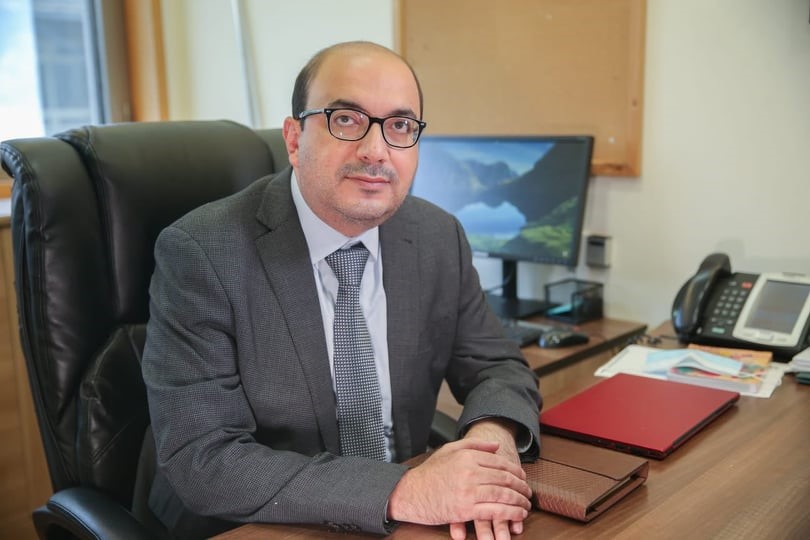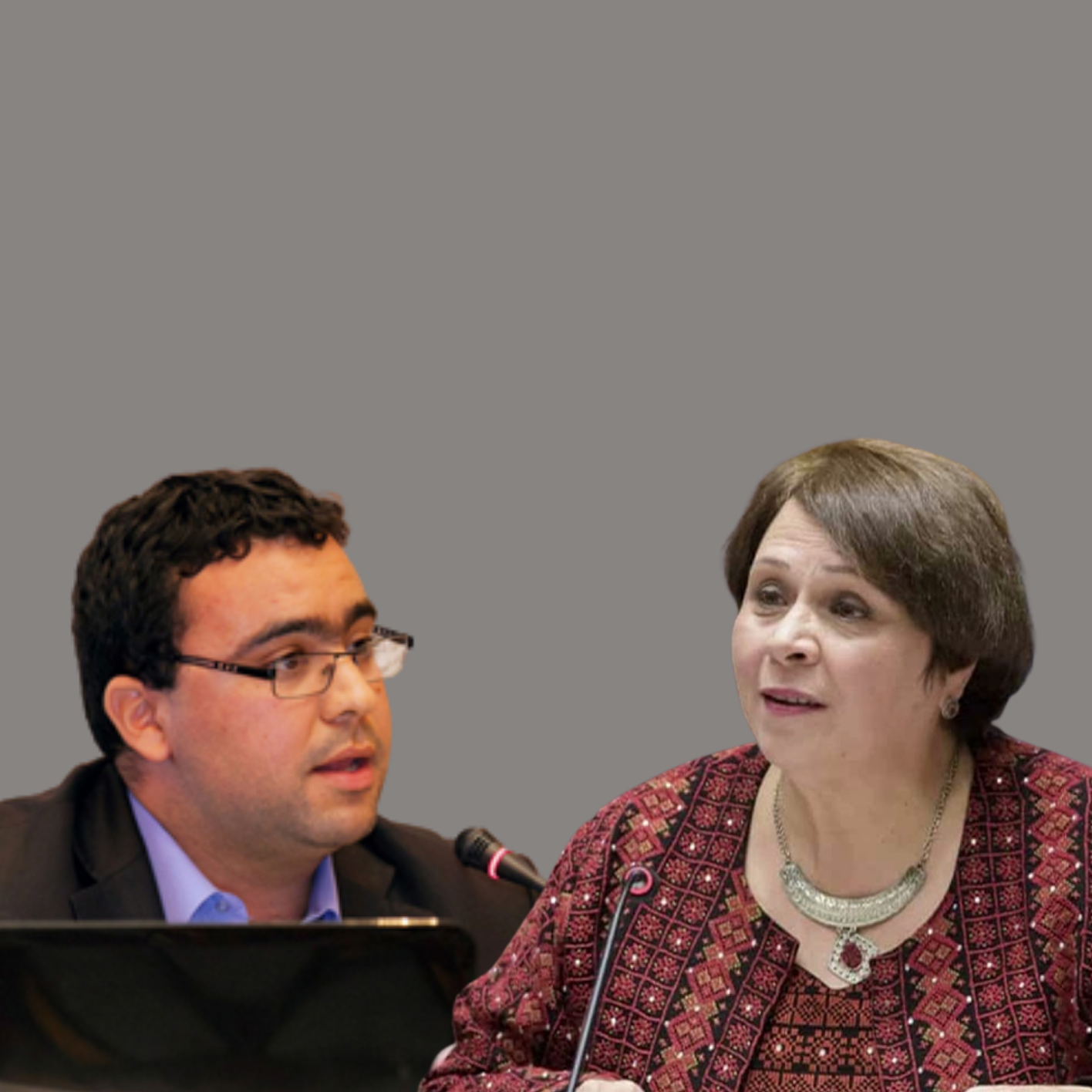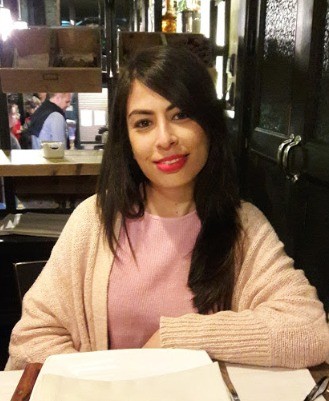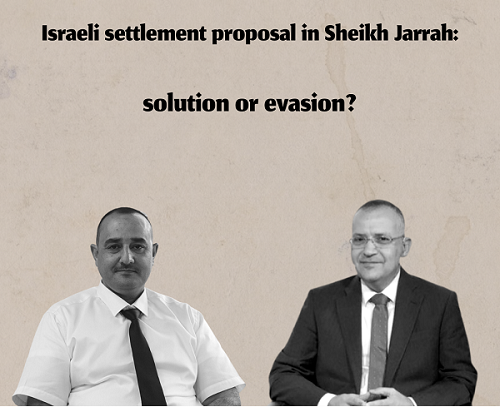
Arab member of Knesset, Sami Abu Shehadeh, representing the Joint List in the National Democratic Alliance, “Balad,” warned against the political discourse of Arabs within Zionist parties, which has reemerged after years of struggle from the national movement among Palestinians inside the Green Line, citing the participation of the southern Islamic movement under Abbas Mansour, in the new Israeli coalition government.
Speaking to “Hosted by MIFTAH”, Abu Shehadeh said it was incorrect to believe there was anything new about Abbas and the southern Islamic movement’s participation in the new Israeli coalition government. He maintains that everything happening today is similar to the political discourse used by Arabs in Zionist parties over many years.
Even in the 50s, Abu Shehadeh says there were Arab parties affiliated with Zionist ones. In order to win Arab votes, the ruling party at the time, Mapai, worked towards creating Arabs lists associated with it. “I even think it had the same name: the Unified Arab List. In practical terms, this type of political discourse, which alleges that there can only be political impact from within the coalition, was really just a classic line used by Arabs in Zionist parties.”
He adds, “In my opinion, the mentality, political language and discourse are similar. What’s new is that the southern Islamic movement adopted this discourse, thus somewhat departing even from its own political discourse without an explanation as to why. When they were part of the Joint List, they said they were adopting a new approach. When we spoke to Mansour Abbas to get an explanation and why this new approach had crossed every red line he refused to give one.
“The truth is,” Abu Shehadeh says, “there is a new approach largely based on old premises adopted by Arabs in Zionist parties. For us in the Joint List, this approach is unclear. One member of Mansour Abbas’ list, Saeed Kharrum, from the Negev, refused to vote for the Bennet/Lapid government. It is important to remind people that we thought this discourse was over and done with after the long battle of the national movement inside [the Green Line], but it is now being brought back by the southern branch of the Islamic movement.”
Challenges at hand
MK Abu Shehadeh says there are many challenges imposed by this new reality, the most jarring one being the departure from a consensus over national principles and the problematic political discourse being presented. The first challenge he maintains, which is the most important, is that it targets the history of our struggle over the past 73 years. “This is why they keep repeating the same line: You have had 73 years and what have you done?” This is a process that holds contempt for and marginalization of everything the Palestinian national movement on the inside accomplished since the Nakba and this is extremely dangerous. The other thing is the claim that political influence can only be within the coalition; that is, you must adopt the broad guidelines of the government even though it is clear to them and to the community at large that this coalition is against you and against the interests of your people. “We have always worked towards raising the ceiling and have tried to break the boundaries the Zionist movement has set for us,” Abu Shehadeh says. “The southern branch of the Islamic movement crossed the boundaries we set for ourselves and adopted the nation-state law, stooping that low and accepting Jewish supremacy. It also accepted the rules of this racist game. In reality, this divides us into moderate Arabs and extremist Arabs – that is, moderate Arabs who accept the Jewish state and the extremist Arabs who fight for equality.”
Building national unity for Palestinians on the inside
Abu Shehadeh believes the uprising brought attention back to the importance of reorganizing the national movement on the inside [of the Green Line] “and this is the most significant achievement, because now there is an opportunity for us as a leadership of the Arab Palestinian people to sit down together and review the political program of all forces and parties, whether Balad, Abna Al Balad or national and independent figures. What unites these groups is more than what divides them and we are capable of rallying around a unified resistance strategy through a united political program. I have said it time and again that one of the disputes is whether to be part of the Knesset or not. We can sit and discuss this issue and we are willing to reconsider it and take a collective decision on it; if there is a majority in the national movement, Balad will be part of it.”
He adds, “Another thing I would like to point out is that we have a lot of small movements. Unfortunately, in order for these movements to legitimize their existence, they tend to highlight every dispute and dismiss the points we agree on 99% of the time. Today, these groups want to justify their existence so they go one step further, distancing us from our political discourse or any objective political discussion. All of us – parties and movements – and anyone who sees themselves as part of the national movement inside the Green Line must put everything on the table and agree on a political program. I plan to hold a meeting for intellectuals from all the movements so we can exchange viewpoints on what’s going on, so we can hopefully unite the Palestinian national movement inside.”
The relationship with youth movements
Abu Shehadeh says that the relationship with youth movements is part of their struggle and history, one of which he was part. “As a son of these movements, I grew up with them and helped establish some, including the Jaffa Youth Movement and the “Jafra” student movement in Tel Aviv University. Hence, I see hope in these movements for our national project even if I know there are many problems with them, first and foremost that they are outside of any political framework. Secondly, they do not have a clear and agreed on political project. I appreciate the elevated spirit of sacrifice among the youth and their willingness to fight the good fight and feel they are part of the cause, which is a good foundation to build on. However, if this is not institutionalized, we will lose the entire movement. As leaders, we must open the doors of all political parties and movements to these youth and if they are not satisfied with any one party, they should create a new one and we will support them. Still, without putting this action into a framework and institutionalizing it, all of these efforts will be in vain.”
Abu Shehadeh adds that the world has changed a lot and that their leadership inside the Green Line and also the leaders of Palestinian factions lost touch with the people, especially the youth, which make up the majority of the population. He says the youth lived a completely different experience from that of the leadership, resulting in a serious disconnect between the two. “Writing a communique was, a project in and of itself in my time: typing, proofreading and distributing them required a lot of effort. Today, in this connected world of social media, things are written, proofread and distributed in minutes. This is a new world and a different culture and language. If you want a relationship with these youths, you have to live with them, get close to them. There are basic principles we all agree on with the youth; our demands and political principles are one and the same and from this standpoint we must establish our relationship. Our role is to give them more space in leading actions and the struggle.”
The “uprising of dignity”: three-pronged Israeli attack on 1948 Palestinians
In regards to the impact the uprising had on Palestinians inside the Green Line who were the target of violent assaults by the Israeli security establishment, Abu Shehadeh says: “It is important to clarify that the attacks on Palestinians inside were three-pronged: the first was from the Israeli police, security services and the Shabak. All of their assaults were illegal and inhumane. They were so violent they contravened even with Israeli law much less with international law. Several protesters were shot and wounded.
Attacks also came from a second direction, which were the settlers, who organized in large numbers on social media and descended on the cities with one goal, which was to attack our people. This was especially true in Lod, which bore the brunt of these attacks. Other assaults took place in Jaffa, Haifa, Ramleh and Akko. The settlers attacked us, our properties and our holy sites and they were not held accountable whatsoever. The martyr, Mousa Hassouna from Lod, was shot by settlers, not by the police as were many others in the city. As for Jaffa, settlers were attacking under the protection of the police.
The third type of attacks were carried out by regular Israeli citizens, like what happened in Ramleh when a Palestinian youth was attacked by residents of the apartment building where he and his family live. He had to be taken to hospital and even there, Israeli physicians failed to offer him the treatment he needed, dealing with him as the aggressor.”
Thousands of arrests and unjustified violence
The ‘uprising of dignity’ seriously scarred the relationship between the ruling power in Israel and the Palestinians living there, especially how the state’s security services dealt with an iron fist to crack down on the uprising. The most visible show of this was the arrest of thousands of Palestinians on the inside. “We had 2,200 people arrested following the uprising, but even with all of the false narratives used to justify these massive arrests, the state could not indict the majority of them, which mean that 90% were released. Only 10% were indicted, all with false charges. The objective of these arrests was clear: sheer intimidation, which was also apparent by the police violence used against them, their families and their properties during their arrest.”
Major repercussions
In terms of the impact these attacks on Palestinian citizens of Israel had, Abu Shehadeh says: “Anyone who had accepted the “Israelization” approach now reached the conclusion that they needed to change course. They realized that the national movement’s interpretation of the situation had been correct. I felt this at the personal level when people started listening to my analyses and speeches, which was not the case a month and a half earlier. Today, the people who attend political symposiums are ten times more than before, which shows how the people are now prepared to halt this slide towards Israelization and return, encourage and listen to the national discourse. Acceptance of this analysis is a historic opportunity for us and we must build on it by opening up new horizons and hope for the struggle. The old discourse is no longer valid.”
New horizons of Palestinian national struggle
Abu Shehadeh believes there are new opportunities for the Palestinian national struggle inside the Green Line that should not be missed. “We want to open new horizons for the struggle. On the international stage, we must give this space the weight we did not give it before and open these prospects up. That is why we broached the subject of international protection after all of the attacks on us. We will also try and build relations with parties and human rights institutions on the outside so they know we are here and that we exist. We want to embarrass Israel on the international platform and call out its racial discrimination against its Palestinian citizens. We now have the space and a democratic, human and political discourse that everyone is willing to listen to and therefore the opportunity to internationalize our cause. “
The new American position on ‘48 Palestinians
The “dignity uprising” and the crackdown and harassment of Palestinians inside highlighted a new and important development in the American position towards their cause, said MK Abu Shehadeh. He said US President Joe Biden and his Secretary of State, Antony Blinken made new and significant statements in regards to the Palestinians inside the Green Line. Blinken, for example, called on the Israeli government to treat Christian and Muslim families inside Israel equally. ‘While we would rather not be treated as sects, but part of the Palestinian people, still, statement seems to indicate that they see us and realize there is another people here.” The other more dangerous statement, however, was made by President Biden, who said there would never be peace if Israel was not recognized as a Jewish state.” We reject this statement because it means the Americans support Israeli racism against 20% of the population of Israel; we are not Jewish and the state of Israel was established on the ruins of our land and people. We are a national minority that suffers from racial discrimination in all aspects of life because of the nation-state law and other racist laws. Preserving Israel as a Jewish state is preserving this historic racism against us, therefore preventing equality. That is why we want Israel to be recognized as a democratic state. We propose a program whereby Israel is transferred from a racist state to a democratic one for all its citizens, Arabs and Jews alike.
We want cultural and not political or economic autonomy
For Abu Shehaheh, recognition of Palestinians does not mean autonomy, which he says is impossible. Rather, he wants cultural independence. “Political autonomy for Palestinians here is very difficult. Why? Because we are not concentrated in one geographic spot; we are distributed throughout historic Palestine, which means it would be very difficult to apply self-rule for people in mixed cities and in Arab-Jewish regional councils. Economic autonomy is just as difficult because we are organically linked to the Israeli economy. Hence, our vision is different, whereby we call for cultural autonomy. For the Palestinians inside, this means the Shabak would not devise our educational programs. It is our right, just like any other minority in the world, to teach our history and our Arabic language to our children. We should be able to teach them poetry and literature as we see fit. We demand that we formulate our curricula and have our own national and cultural institutions including theater, cinema and media and a television station so we can deliver our message to others.
There is a ceasefire…but the battle over narrative continues
While a ceasefire was achieved, Abu Shehadeh says, the battle over narrative is still ongoing. “It is very important to identify the aggressor and also the victim. It is also important to document attacks and introduce our narrative to the media, first and foremost to the foreign media. We must prepare a file for a UN fact-finding mission to investigate Israeli state-attacks and violations against Palestinians inside, who are citizens of this state and are supposed to be protected, not attacked.
For the first time, the UN Human Rights Commissioner made a historic decision for a fact-finding mission to look into the events on both sides of the Green Line. It is our role now to document all the attacks on us by police, the Shabak, settlers and regular Israeli civilians. The issue is not just who pulled the trigger, but it is also about the attacks on our homes and our properties. It is about those who were fired from their jobs by their Israeli employers or the justice system that handled our cases with double standards. At the same time, the killer of martyr Hassuna spent three days in detention and was then released. We have had boys less than 14 years old arrested and who spent nine days in detention for charges such as throwing stones that caused no injuries. We want to document all of these violations and say to the world that Israel’s behavior against its Palestinian citizens proves where this state is headed if it does not carry out its duty and protect its own citizens. There is the possibility of holding this state accountable by international law and it is also possible to have international protection via international monitors to follow up and oversee the actions of Israeli police and security services.”
The “dignity uprising” broke all barriers and borders
The ‘dignity uprising” says Abu Shehadeh, created unprecedented national unity in historic Palestine among a united Palestinian people. “One of the most beautiful things I saw during this uprising was the Palestinian connection, whether in historic Palestine or elsewhere. Social media networks broke every barrier and border, which was clear from the close connection between Palestinians inside the Green Line and our people in Jerusalem. I think this is a strategic and important point that must be built on and in our battle to defend our existence. I remember during Ramadan, when we arrived in Jerusalem, there were tens of thousands of ’48 Palestinians already there, all who held the conviction that they had a political, economic, social and religious role to play. This role, therefore, opens up political horizons and also paves the way to create a broad-based struggle front, which we can call the “front for combatting Israeli apartheid.” This front could be bigger than a front for ’48 Palestinians alone because anti-Zionist Jews could join as well.
The future of the political process between Palestinians and Israelis
On the future of the political process between Palestinians and Israelis, Abu Shehadeh admits he is bothered by the fragility of the Palestinian situation, which depends on American and Israelis election results instead of discussing role and strategy. “There is an overall feeling of frustration and desperation; there is a tendency to look to election results in Israel for a breakthrough in the Palestinian situation. I think we should not depend on this at all, even if Meretz took power. If Palestinian political division does not end and unity over a clear strategic project and action plan for the majority of factions is not achieved, there will be no solution or breakthrough. Meanwhile, the Israelis are not even talking about ending the occupation. Lapid, for example, speaks about improving “the conditions of our slavery”, which he says with all normality and pride. This means that until we elevate our own situation, we must not depend on Israel in anything.”







